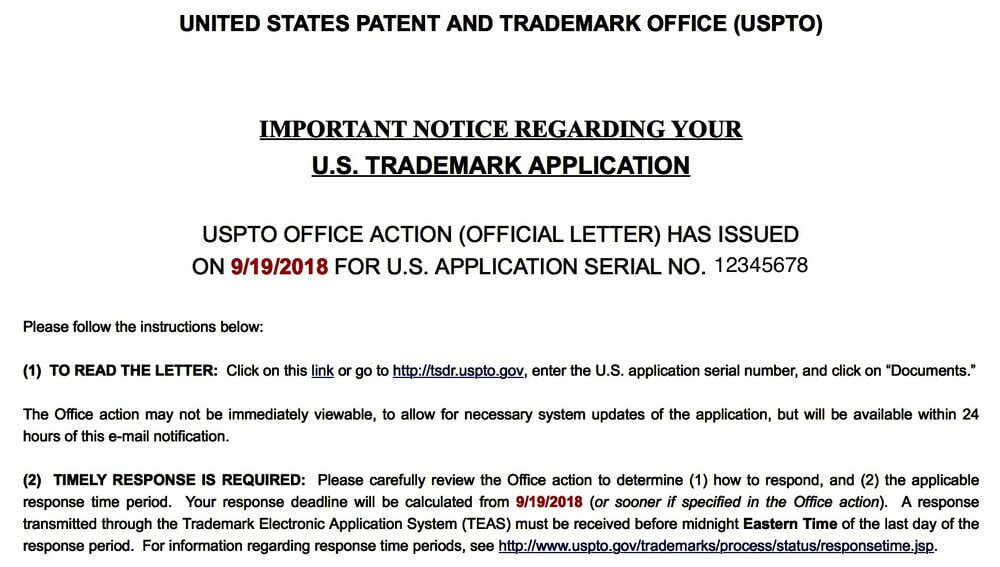Did you get this email?

If so, there’s no need to worry yet. You still have a chance at getting your application approved. I know you’re a DIYer, so you may not be ready to hire an attorney to complete your application. This blog post is going to review a few of the most common refusals in an Office Action, and you can make the determination on whether to complete the application yourself or to hire an attorney. The refusals the blog post will cover are (1) disclaimer requirement, (2) specimen refusal, and (3) likelihood of confusion.
When responding to an office action, make sure you are aware of the different reasons for the denial. Your application may have one reason for denial, but it could have a number of denials. You will want to make sure you address ALL of the denials in the response, or else you may be issued a final refusal.
Disclaimer Required
A disclaimer requirement is usually a simple process, and you usually do not need an attorney to respond to the office action.
A disclaimer is a statement that you provide to the examining attorney to indicate that you do not claim the exclusive rights to an unregistrable portion of your mark. This occurs when you have a multiple word mark that includes a generic word such as “store.” You are not able to prevent another applicant from using the word as part of their mark, because you cannot claim the right to use only that word.
When you receive an office action for ONLY a disclaimer requirement, the email from the examining attorney provides guidance on how to disclaim the word. This is typically a simple process that takes less than 20 minutes.
Specimen Refusal
This refusal occurs when your application is based on “use in commerce.” During the application process, you are required to submit a specimen to show the goods or services in commerce. The requirements differ according to whether you are filing for goods or services.
A refusal is issued when you do not submit a specimen or you do not submit the correct specimen. Again, the specimen requirements are different for goods and services, so you will want to check the USPTO’s acceptable specimen list.
This refusal can be pretty simple to overcome if you know what specimen to submit. However, if you’re not sure, it’s certainly worth it to consult an attorney.
Likelihood of Confusion
This refusal is one that causes the most concern, and I highly suggest hiring an attorney to respond to this office action. This refusal occurs when your mark is likely to cause confusion with a current registered mark.
If you’re a die-hard DIYer, I get it. There are some important things you need to know in order to complete a thorough response. And when I say thorough, I mean you want to address every little thing that distinguishes your mark from the other mark. This will include screenshots of dictionary definitions, website photos, and product or service photos, plus more.
13 Factors when Determining Likelihood of Confusion
In addition to the USPTO’s overall consideration of similarity of the marks and relatedness of goods and services, the USPTO also considers 13 factors when determining likelihood of confusion. You do not have to address all of the factors, but you certainly want to address the factors that pertain to your situation.
The factors that you will need to consider addressing in your response are the following:
1. The similarity or dissimilarity of the marks in their entireties as to appearance, sound, connotation, and commercial impression.
2. The similarity or dissimilarity and nature of the goods or services as described in an application or registration or in connection with which a prior mark is in use.
3. The similarity or dissimilarity of established, likely-to-continue trade channels.
4. The conditions under which and buyers to whom sales are make, i.e. “impulse v. careful, sophisticated purchasing.
5. The fame of the prior mark (sales, advertising, length of use).
6. The number and nature of similar marks in use on similar goods.
7. The nature and extent of any actual confusion.
8. The length of time during and conditions under which there has been concurrent use without evidence of actual confusion.
9. The variety of goods on which a mark is or is not used.
10. The market interface between applicant and the owner of a prior mark:
a. A mere “consent” to register or use.
b. Agreement provisions designed to preclude confusion, i.e. limitations on continued use of the marks by each party.
11. The extent to which applicant has a right to exclude others from use of its mark on its goods.
12. The extent of potential confusion, i.e., whether de minimis or substantial.
13. Any other established fact probative of the effect of use.
You do not have to address each of the factors, but the more you’re able to distinguish your mark from the prior mark, the better chance you have at getting approved.
Conclusion
Of course, these are not all of the possible refusals. You may have been issued a different refusal. But the point of this post is to not give up. Many clients come to us with an office action thinking their mark won’t be approved because of the office action. The first refusal is NOT FINAL. You have 6 months from the date of issuance to provide a response. Sometimes the refusal is a mere technicality with the application, and sometimes the refusal is more in depth that requires several hours of work.
Need Help?
Andrea Sager Law has successfully helped hundreds of entrepreneurs successfully overcome office actions. Schedule a FREE consult below to get Andrea’s help to overcome your office action. Help me with my trademark!


